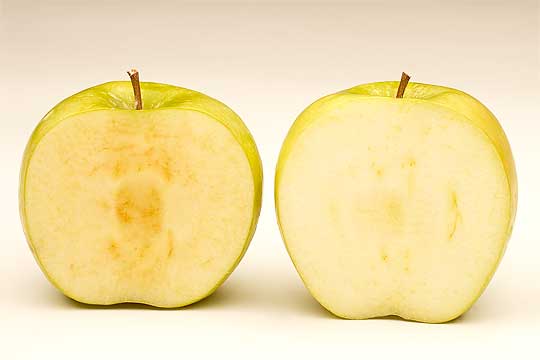
3 Companies Say ‘No’ to GMO Arctic Apples
Wendy’s, one of the nation’s top restaurant chains, has confirmed the company does not plan to sell or use the Arctic apple. In the wake of widespread criticism of the U.S. Department of Agriculture’s (USDA) recent approval of the first genetically engineered apple, the U.S. Food and Drug Administration (FDA) recently deemed the Arctic apple, owned by synthetic biology company Intrexon, safe for consumption, relying only on company data through a voluntary safety consultation. Like other genetically modified organisms (GMOs), the Arctic apple will not be required to be labeled as genetically engineered.
October 20, 2015 | Source: Eco Watch | by Friends of the Earth
Wendy’s, one of the nation’s top restaurant chains, has confirmed the company does not plan to sell or use the Arctic apple. In the wake of widespread criticism of the U.S. Department of Agriculture’s (USDA) recent approval of the first genetically engineered apple, the U.S. Food and Drug Administration (FDA) recently deemed the Arctic apple, owned by synthetic biology company Intrexon, safe for consumption, relying only on company data through a voluntary safety consultation. Like other genetically modified organisms (GMOs), the Arctic apple will not be required to be labeled as genetically engineered.
Wendy’s, which sells apple slices in its kids’ meals, confirmed in April via email to Friends of the Earth that it has no plans to sell Arctic apples. McDonald’s and Gerber have also stated that they have no plans to source or sell this genetically engineered apple.
“Wendy’s is wisely listening to its customers by joining other major food companies and apple growers in rejecting this unnecessary and risky genetically engineered apple,” said Lisa Archer, food and technology program director at Friends of the Earth. “It’s becoming increasingly clear that there is no demand for this new GMO.”
Despite growing public demands for transparency and GMO labeling, large chemical and food companies continue to push for a Senate bill that correlates to to HR 1599, dubbed the Deny Americans the Right to Know (DARK) Act. This bill, recently approved in the House of Representatives, would preempt state and local authority to label and regulate genetically engineered food, allow food companies to make false “natural” claims about foods containing GMOs and codify the failed system of voluntary labeling of GMOs. A Senate Agriculture Committee hearing on GMO regulation has been scheduled for Oct. 21.
Consumer outcry over the USDA and FDA’s approval led 10 environmental and consumer organizations to ask Burger King, Wendy’s Company, Subway and Dunkin’ Brands to refrain from selling the Arctic apple, which may pose numerous environmental, health and economic risks. Friends of the Earth, CREDO, Center for Food Safety, Food & Water Watch, Green America and Organic Consumers Association have gathered more than 266,000 petition signatures urging major fast food restaurants and food companies to not source GMO apples.
Major apple growing associations, including USApple and the Northwest Horticultural Council (representing Washington apple growers, who grow more than 60 percent of U.S. apples), have also opposed the GMO apple, some voicing concerns that potential cross-contamination may cause important export markets such as Europe and China to reject U.S. grown apples or require costly testing and certifications from farmers and exporter companies.
